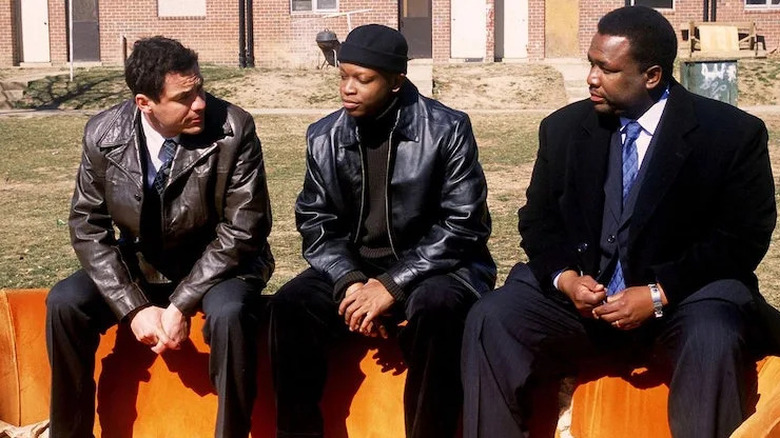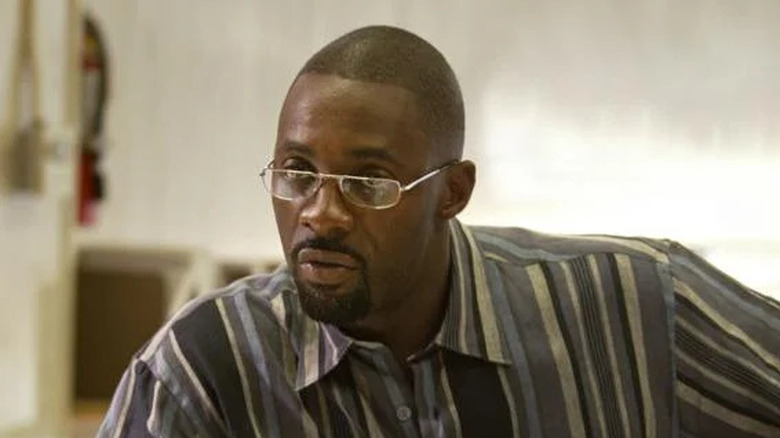Being In The Wire Writers Room Was Like Watching A Title Fight
"We're building something here, detective. We're building it from scratch. All the pieces matter."
That's Det. Lester Freamon (Clarke Peters) talking about an ongoing wiretap investigation with a colleague, emphasizing the need to pore over every element in service of the bigger picture. Such was the climate of the writers room on "The Wire," one of HBO's most lauded drama series to date, 20 years beyond the airing of its pilot episode in 2002. The big picture was vital, because this wasn't just a cop show. Creator David Simon pitched "The Wire" as such to HBO's miniseries division, but the drug dealers and lawmen were only templates for a prosaic small-screen novel observing the monstrous failure of the war on drugs through the slow demise of an American city.
Simon had learned to write episodic TV during his tenure on staff for "Homicide: Life on the Street," the award-winning NBC series based on Simon's 1991 book detailing his time embedded with the Baltimore Police Department's homicide unit. The immersion gave Simon a sense that the real problem lies with institutions, not individuals. Where "Homicide" had lone bad cops, "The Wire" was a chance to shine a light on a bad system.
With realism staying due north, Simon supported his philosophy with the writers he chose for the series. Urban/crime writers George Pelecanos, Dennis Lehane, and Richard Price would buttress his vision, but Simon had his creative complement in Ed Burns, formerly the lead detective in the wiretap case that led to the arrest of local drug kingpin Melvin Williams, back when Simon covered it in 1984 for the Baltimore Sun. As a collaborator on "The Wire," Burns was the push to Simon's pull when it came to plot direction. The result was combative, but it yielded rewards.
'It was like the Bolsheviks versus the Mensheviks'
The debates between Ed Burns and David Simon transpired with the construction of each episode over the show's run. A proposed setting was no good, Burns might argue, because it didn't have a believable layout for a drug stash location. And why use outdated beepers over cellphones? Often they'd get into the macro as well as the micro, allowing a minor plot point to swell into deliberation over Baltimore's political system. To season two staff writer Rafael Alvarez, watching the two go at it for hours over details was almost a spectator sport, as he told The Guardian:
"The final decision was always David's, but he encouraged debate and wanted to be persuaded that there was a better way to go, if you could argue it successfully. In one meeting, David and Ed went at it, over something I don't recall, for more than an hour-and-a-half, with the rest of us watching like it was Ali v Frazier."
Brett Martin's 2013 book "Difficult Men" further points out the pair's contentious partnership, with storytelling and accuracy sitting across the table from one another, each angling for narrative purchase. Among the book's references are Eric Overmeyer, consulting producer and season four writer for "The Wire":
"I don't think there were ever names called, but things could get heated. Certainly the subtext was, 'I think you're ridiculous and that's the worst idea I ever heard.' David's pretty left-wing, but Ed, I think, is even left of him. It was like the Bolsheviks versus the Mensheviks."
The book provides Burns' reasoning for being such a stickler for details: The Baltimorean considered the minutiae to be a "down payment to the audience," one that secured the suspension of disbelief when the series would later call for it.
All the pieces matter
For his part, David Simon was grateful for the back and forth about beepers as the dealers' go-to devices, and for the squabbles about the mechanics of high-rise project housing. As he was quoted in "Difficult Men":
"I never liked fighting with Ed because it was tiring and slowed the process down, but I never had a fight with him that, in the end, didn't make the show better."
And the show was better for it: The writhing relationship between art and truth provided ample room for a mythos to enter into "The Wire" in its larger-than-life characters, some of them echoes of real-life cops, robbers, and addicts Burns and Simon came to know on the police/reporter beat: stickup man Omar Little (Michael K. Williams), a trickster demigod of the street; Detective Jimmy McNulty (Dominic West), the flawed seer who observed the real problems in his institution, to his own career detriment.
But the characters wouldn't move according to some Greek tragedy template; they contained hesitations and multitudes that gave them more depth than their fictional crime show predecessors. Avon Barksdale's shrewd second-in-command Stringer Bell (Idris Elba), for example, was too business-minded for the gangster life; one of the series' moments of levity comes with Stringer trying to apply Robert's Rules of Order to a co-op meeting of drug suppliers, "like Republicans and s***." That tangibility gave weight to Simon's "Baltimore version of Olympus," simultaneously journalistic (of the peoples of the drug war) and resonant in the tragedy of watching them fail to overcome the titan forces of capitalism, America's greatest antagonist. As the Baltimore maxim goes, it's all in the game.

